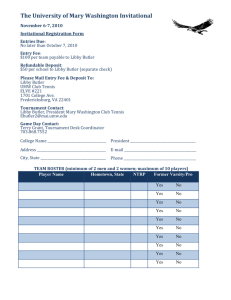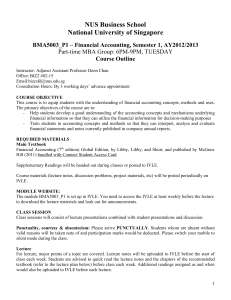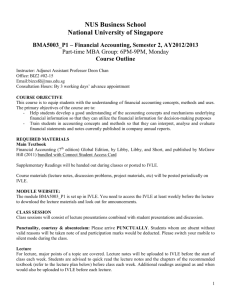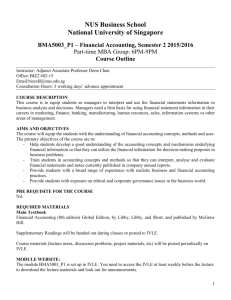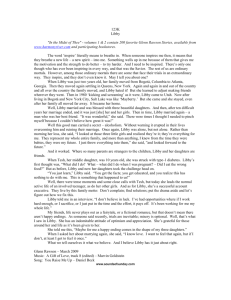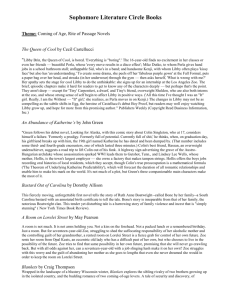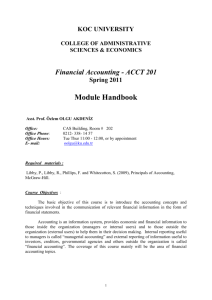NUS Financial Accounting Course Outline - BMA5003_P1
advertisement
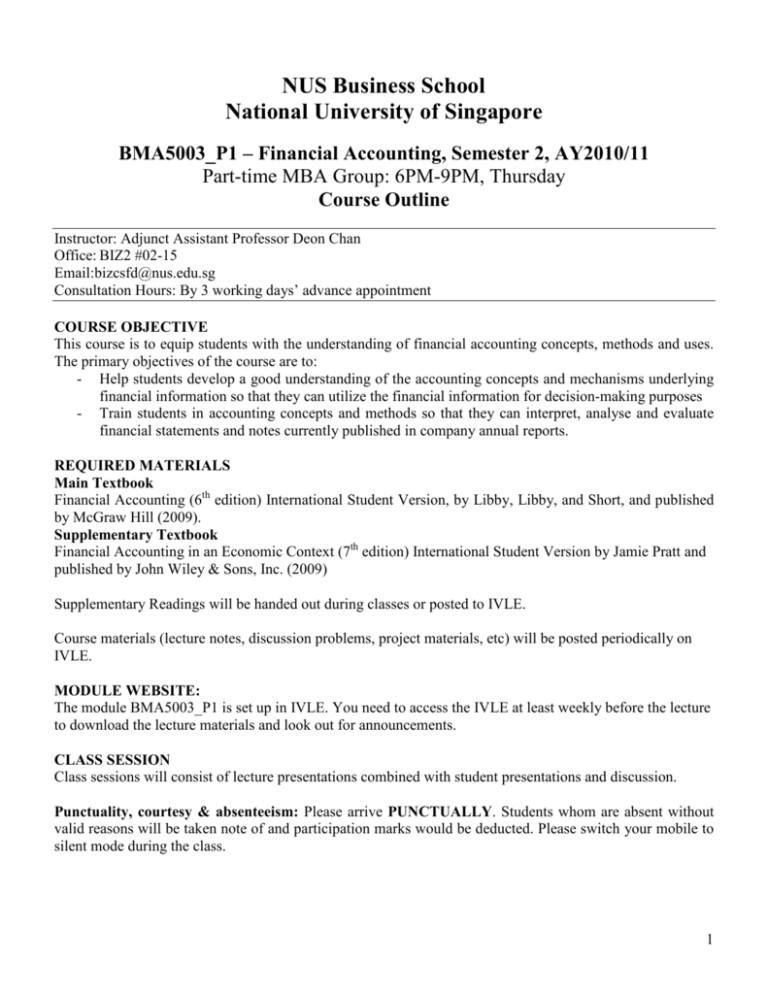
NUS Business School National University of Singapore BMA5003_P1 – Financial Accounting, Semester 2, AY2010/11 Part-time MBA Group: 6PM-9PM, Thursday Course Outline Instructor: Adjunct Assistant Professor Deon Chan Office: BIZ2 #02-15 Email:bizcsfd@nus.edu.sg Consultation Hours: By 3 working days’ advance appointment COURSE OBJECTIVE This course is to equip students with the understanding of financial accounting concepts, methods and uses. The primary objectives of the course are to: - Help students develop a good understanding of the accounting concepts and mechanisms underlying financial information so that they can utilize the financial information for decision-making purposes - Train students in accounting concepts and methods so that they can interpret, analyse and evaluate financial statements and notes currently published in company annual reports. REQUIRED MATERIALS Main Textbook Financial Accounting (6th edition) International Student Version, by Libby, Libby, and Short, and published by McGraw Hill (2009). Supplementary Textbook Financial Accounting in an Economic Context (7th edition) International Student Version by Jamie Pratt and published by John Wiley & Sons, Inc. (2009) Supplementary Readings will be handed out during classes or posted to IVLE. Course materials (lecture notes, discussion problems, project materials, etc) will be posted periodically on IVLE. MODULE WEBSITE: The module BMA5003_P1 is set up in IVLE. You need to access the IVLE at least weekly before the lecture to download the lecture materials and look out for announcements. CLASS SESSION Class sessions will consist of lecture presentations combined with student presentations and discussion. Punctuality, courtesy & absenteeism: Please arrive PUNCTUALLY. Students whom are absent without valid reasons will be taken note of and participation marks would be deducted. Please switch your mobile to silent mode during the class. 1 Lecture For lecture, major points of a topic are covered. Lecture notes will be uploaded to IVLE before the start of class each week. Students are advised to quick read the lecture notes and the chapters of the recommended textbook (refer to the lecture plan below) before class each week. Additional readings assigned as and when would also be uploaded to IVLE before each lecture. Class Participations (10%): Please participate during the case discussions and lessons actively. Marks will be given for class participations. Please participate by asking questions, answering questions posed by lecturer and fellow students, offering opinions, relating material taught to your working experiences, commenting on presented solutions to assignments. Assignment Presentations and Discussions (15%) The purpose of the assignment is to help you to practice the accounting concepts and mechanisms, and apply them to the questions. All students are expected to complete the assignment questions before the class regardless whether they are making the presentations. For each topic, a group will be assigned to present the solutions to selected questions, while the other students are expected to contribute to the discussion of the answers. Due to time constraint, sometimes not all the questions can be discussed during the class, by which, the suggested solutions will be uploaded by the instructor for self-checking. The grading will be based on the solutions submitted and the presentation. Solutions in word document and the presentation slides should be uploaded to the student’s workbin 2 working days before the lecture, i.e., by Tuesday 12noon. Please submit by the deadline stated. Please note that for late submission, one mark will be deducted for each day of late submission for all group members. Please e-mail lecturer if you are late in your submission. ANNUAL REPORT PROJECT (25%) This is a group project where the group will perform an analysis of a real-world company annual report by applying the accounting concepts and methods taught in the course. It requires the reading and analysis of annual report of listed companies. It serves to integrate all the topics covered and is also the self-learning component of the course. Deliverable will be the Project Report. Limit to the number of words would be announced during the class. Grading will be based on clarity, conciseness and correctness of the written report of your analysis. Details on the course project will be provided later. EXAMINATION (50%) The final examination is an open-book, open-notes exam. All materials covered during the semester in lectures, presentations, assignments, assigned readings and group project are examinable. All Universityapproved calculators are permitted. Any other electronic and mobile devices e.g. laptop, smartphones and mobile phones are not allowed. EVALUATION Your final grade will be determined on the following basis: Exams Homework submission and presentation Annual report project Class participation 50% 15% 25% 10% 100% 2 Lecture Plan Lecture 1 2 3 NO LECTURE Date Topic Overview, Fundamentals and 13-JAN Mechanics of Financial Accounting Presentation Questions Readings* Pratt Ch1, 3 & 4,Singtel Annual Report Concepts and Understanding of 20-JAN Balance Sheet Concepts and Understanding of Income Statement Libby Ch2, Pratt Ch 2 Communicating and Interpreting 27-JAN Accounting Information Libby Ch 5, Pratt Ch 5 3-FEB Libby Ch3, Pratt Ch2 CHINESE NEW YEAR – PUBLIC HOLIDAYS ~ Make up on 24 Feb 4 Performing Financial Statement 10-FEB Analysis 5 Concepts and Understanding of Sales Cycle, Receivables and Cash 17-FEB Management 6 Cost of Goods Sold and Inventory Accounting (Make up Lecture. 24 Feb 24-FEB is during recess week) 7 Concepts and Understanding of Long 3-MAR Term Assets and Intangibles Pratt E3-7, ID3-1,ID3-2,ID33, ID3-8, ID3-11 Pratt P4-2,P4-3a,P4-4a,b,P46,P4-10 NO LECTURE Libby Ch 14, Pratt Ch5 Libby P2-5 Qn1-3, E3-4 Libby E3-10 Qn1-3, E3-11 Qn1-3, AP3-4 Qn1-4. Libby Ch 6 Libby E6-2 and E6-4, P61,P6-2,P6-4 Libby Ch 7 Libby Ch 8 Libby P6-5, E7-8 and E7-12, P7-1,P7-2 8 Concepts and Understanding of 10-MAR Liabilities and Debts Financing Libby Ch 9 & 10, Pratt Ch11 Libby P7-5,CP7-7, E8-7 and E8-17, P8-2 9 Concepts and Understanding of 17-MAR Owner's Equity Libby Ch 11, Pratt Ch12 Libby P8-8, P8-10, CP8-10, CP8-11 10 Concepts and Understanding of 24-MAR Investments 11 Concepts and Understanding of Cash 31-MAR Flow Statements Libby E9-4,E9-15, P9-4,P914, AP9-6 Libby Ch 12 Libby P10-8, AP10-5,AP10-6, CP10-5,CP10-6 Libby Ch 13 3 12 Synthesis of Financial Reporting and 7-APR Ethical Issues of Accounting TBA Libby E11-11,E11-14, P11-2, P11-8,P12-3,P12-4 Libby E13-7,E13-13, E1316,P13-1, P12-5,P12-6,P12-8 13 Course Wrap-up, Project Review & 14-APR Assignment Presentations - 14 Submission of Project 21-APR Reading week - 15 28-APR Break 16 5-MAY Examination *- For supplementary readings for the lecture, please download from IVLE. Module Website Resources 1. www.sgx.com.sg This is the website through which all corporate information and share information are found. The annual reports reside in Listed Companies – Annual / Financial Reports link. Weblink is http://www.sgx.com/wps/portal/marketplace/mpen/listed_companies_info/annual_reports_financial_reports You need to access the above to download the Singtel and other company’s Annual Report for lecture and project. 2. www.asc.gov.sg/frs/index.htm All financial reporting standards for Singapore are found in the above weblink. It is not essential to understand all that is written in the standards as BMA5003 is an elementary module that cover the basic principles and not the detailed rules in the standards, usually covered in intermediate accounting courses. Advisory Although this module is a basic accounting module, students who have no accounting or business finance background are likely to find it challenging at the beginning. This is because this will be a new language with its own unique terminology, concepts and rules, hence time and efforts are needed to familiarize with them. Do not give up. Work hard and hope you will have an enjoyable learning experience equipping you with the knowledge to the accounting world. 4
